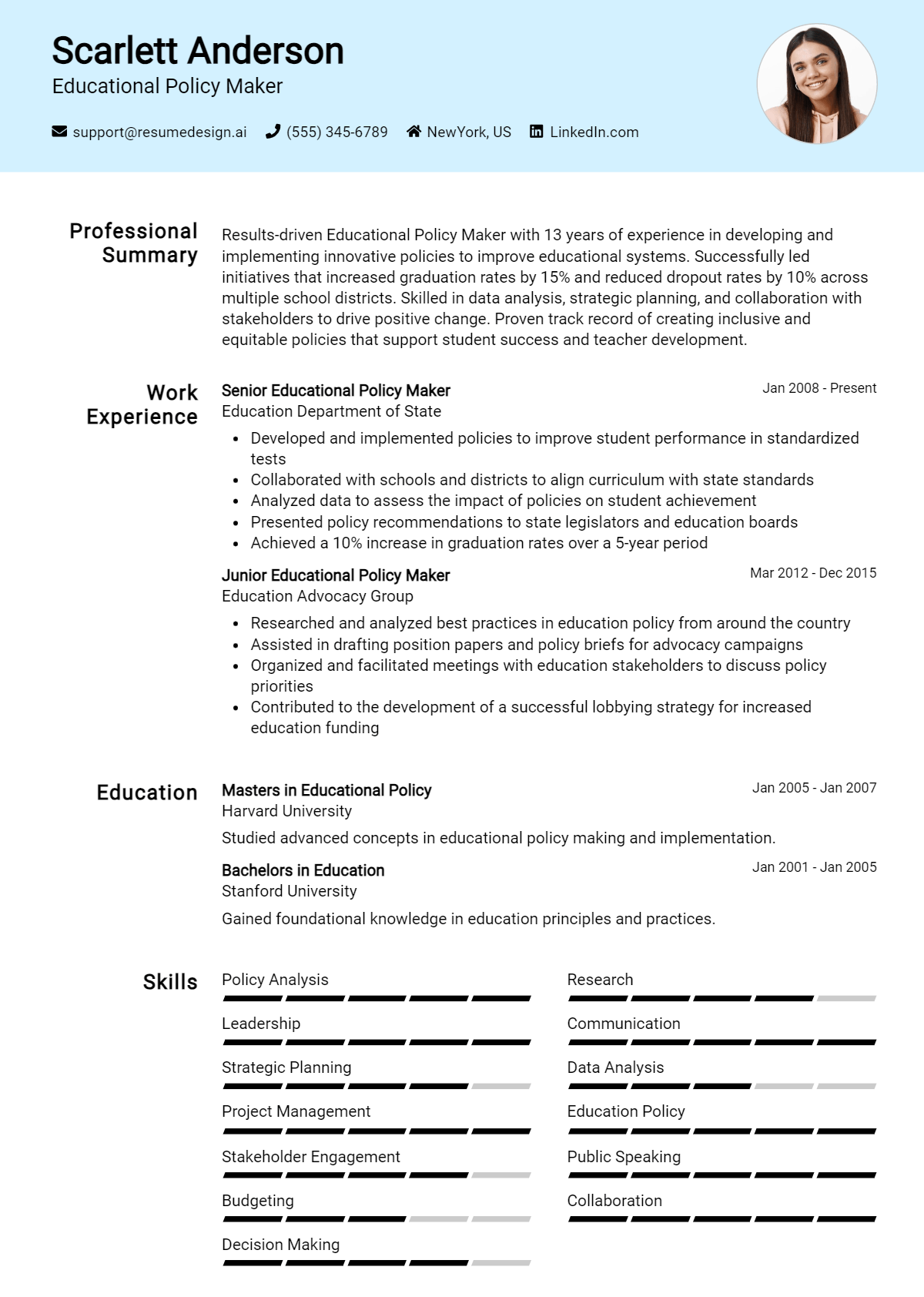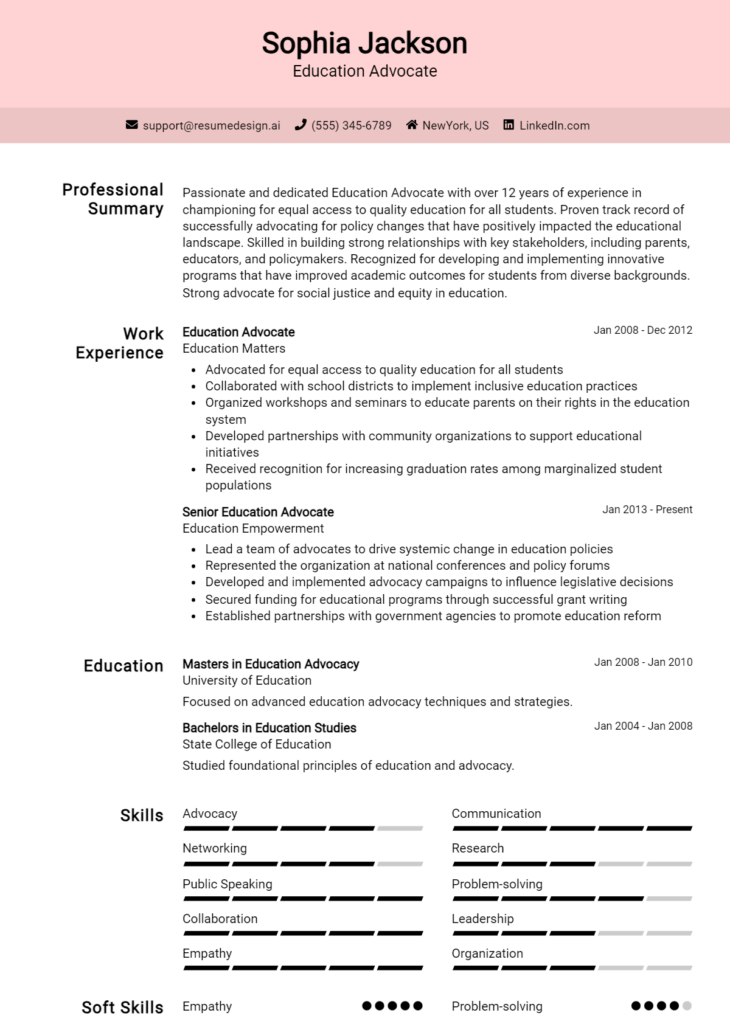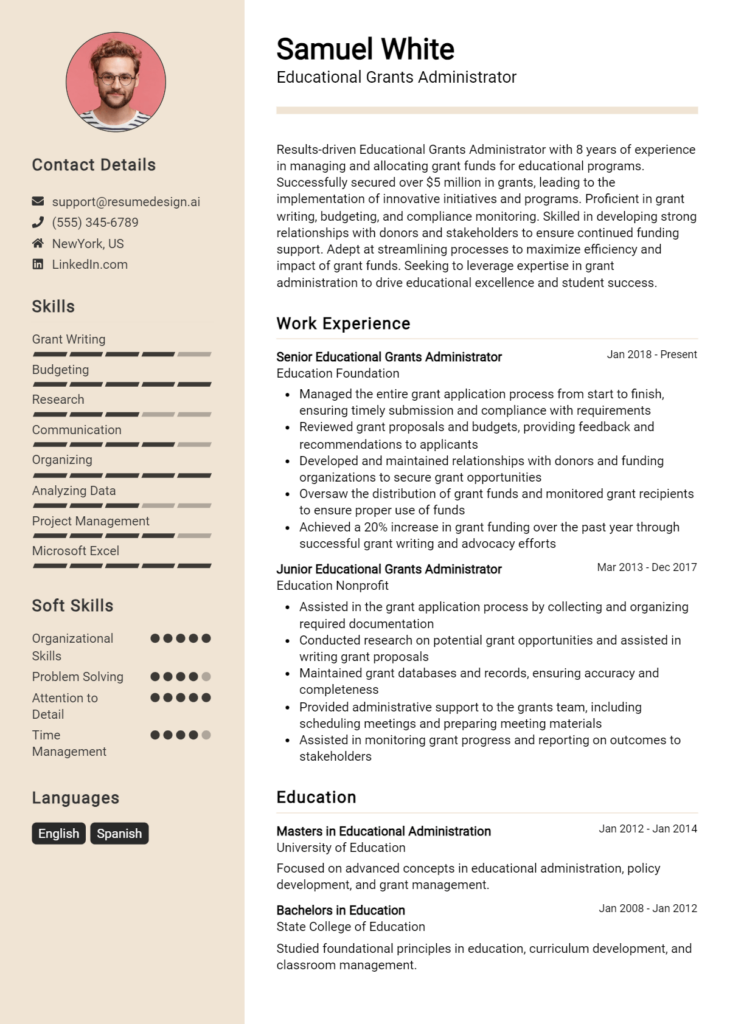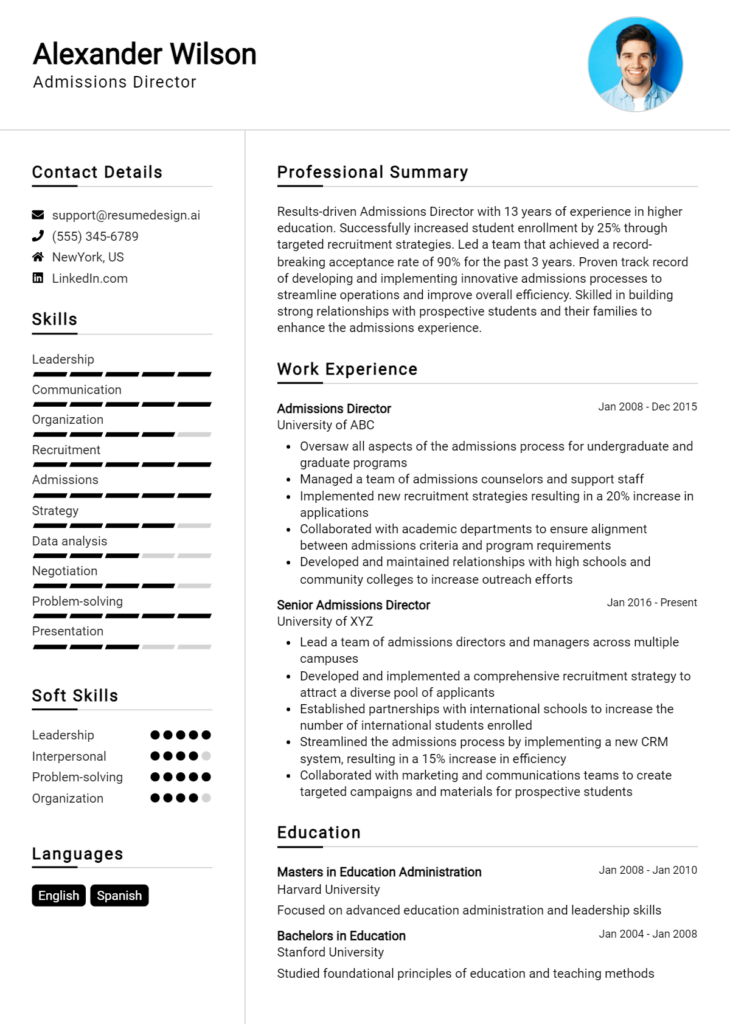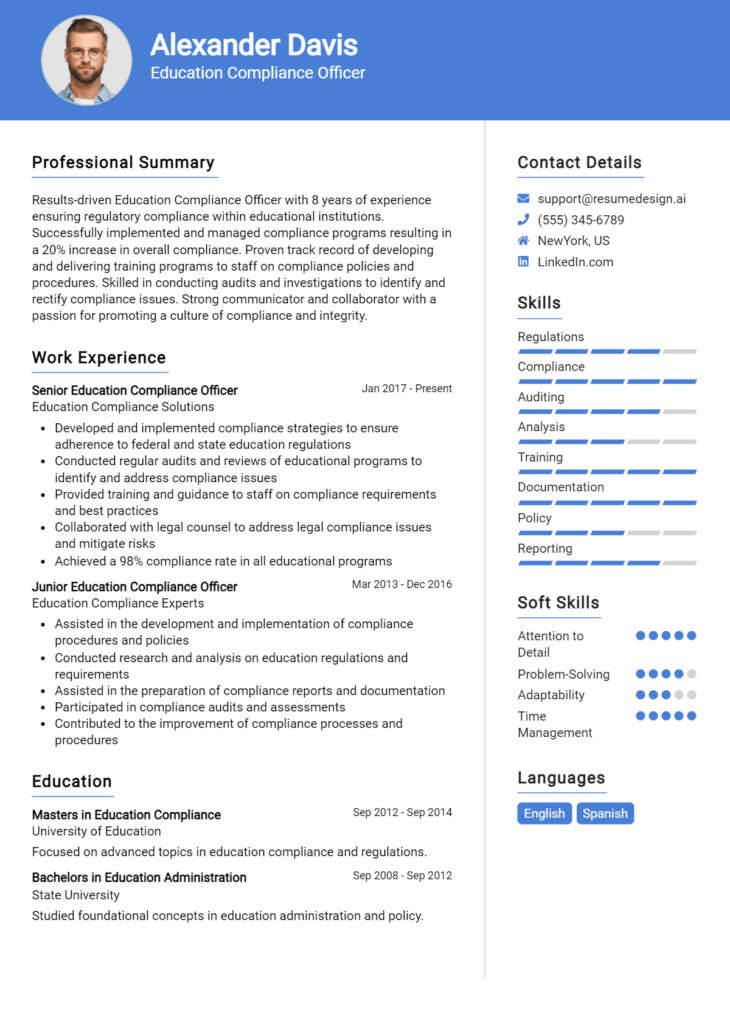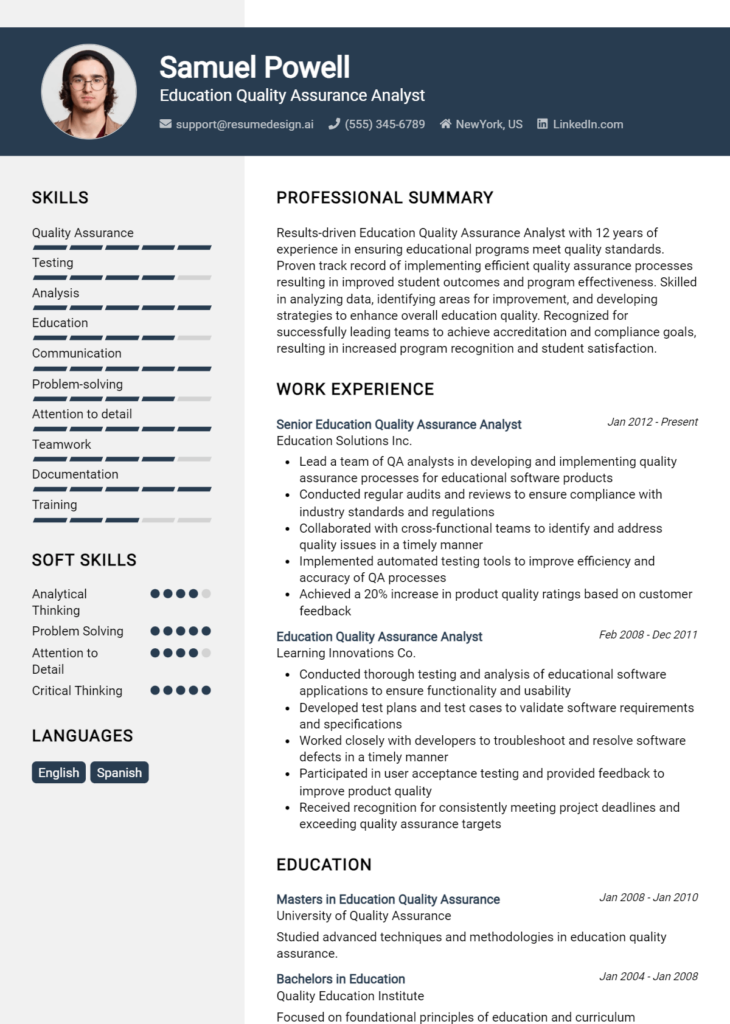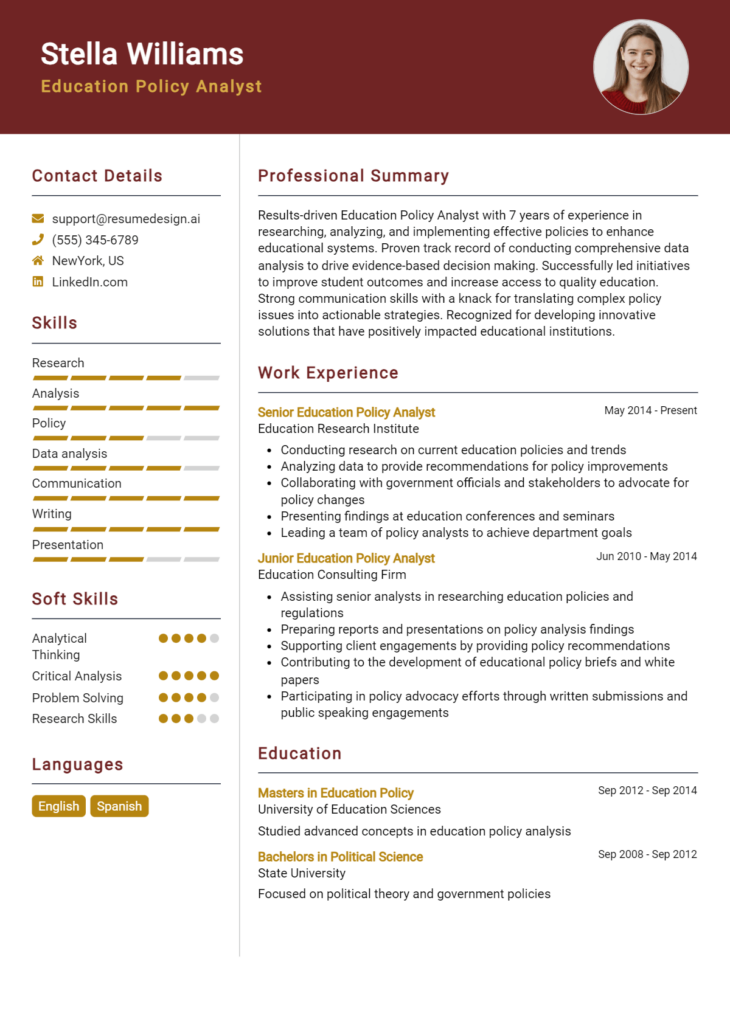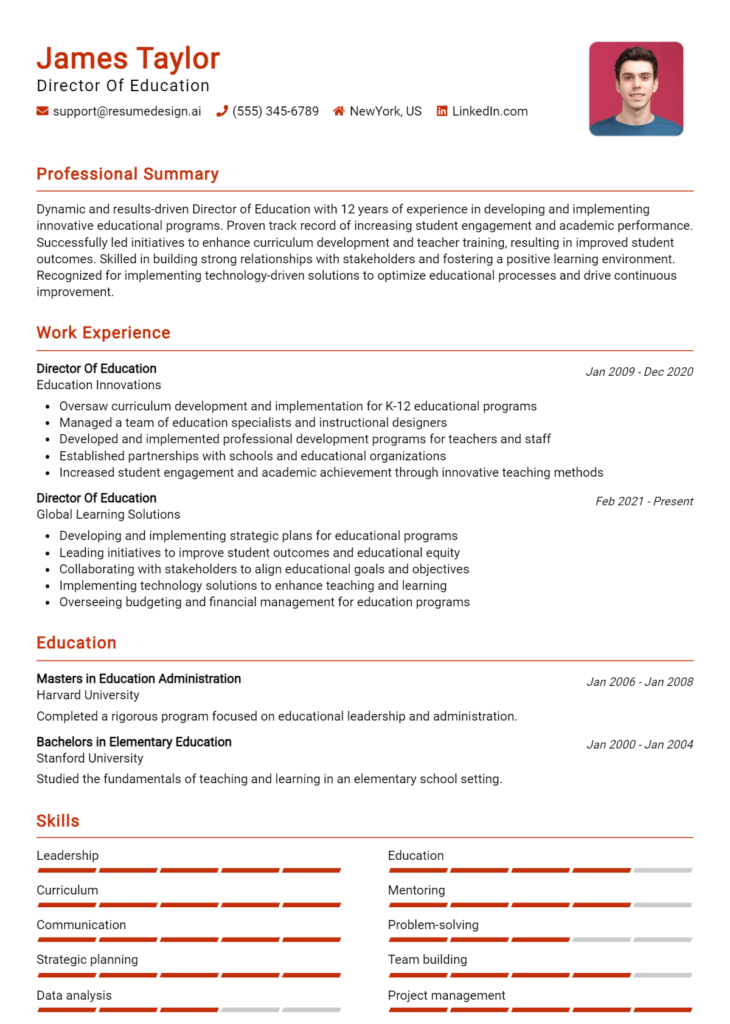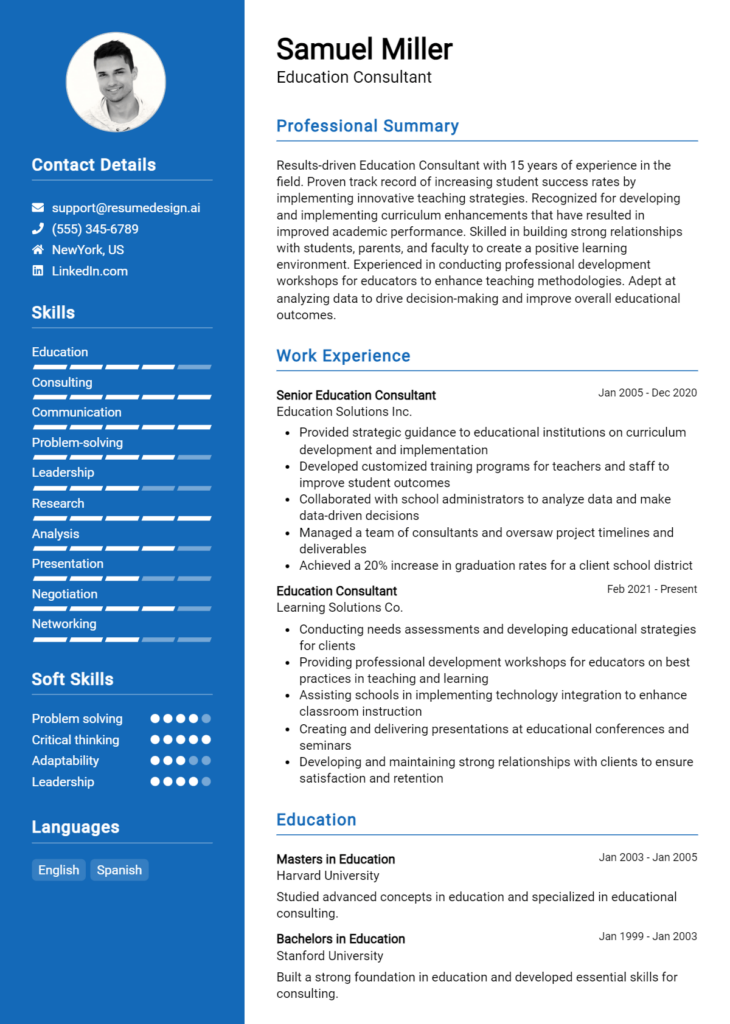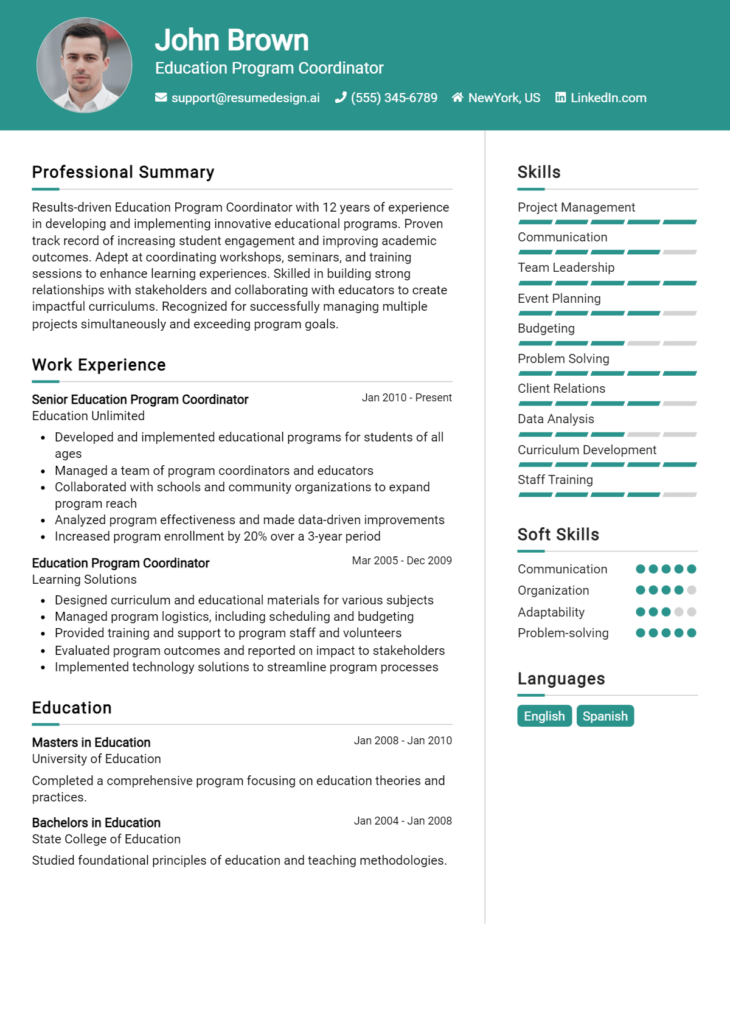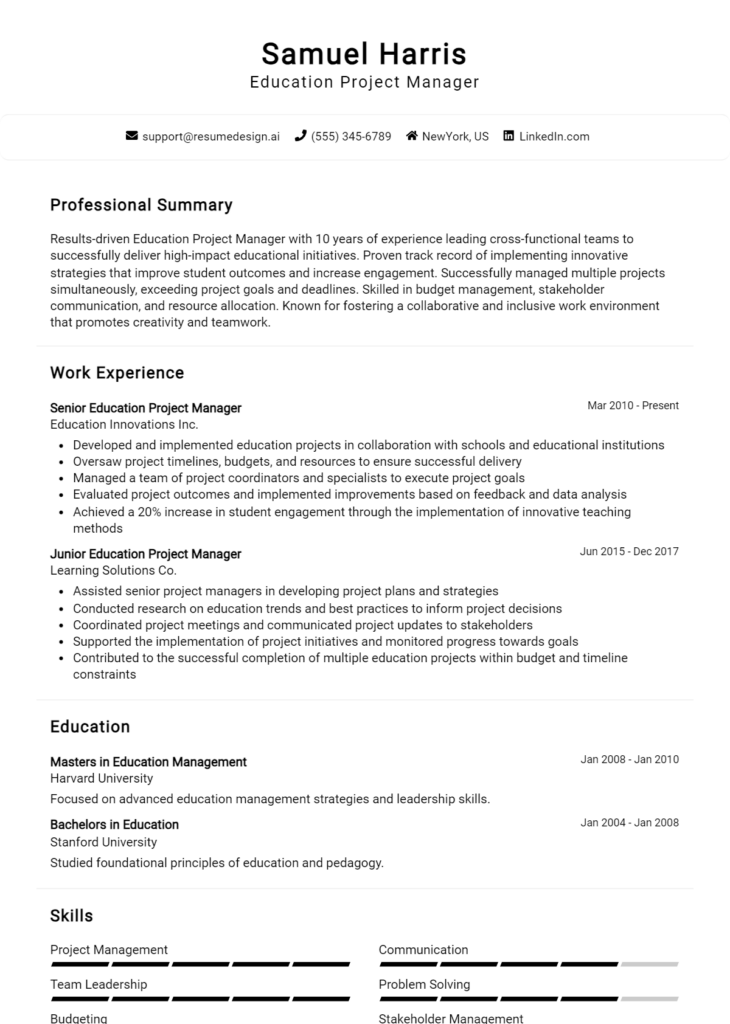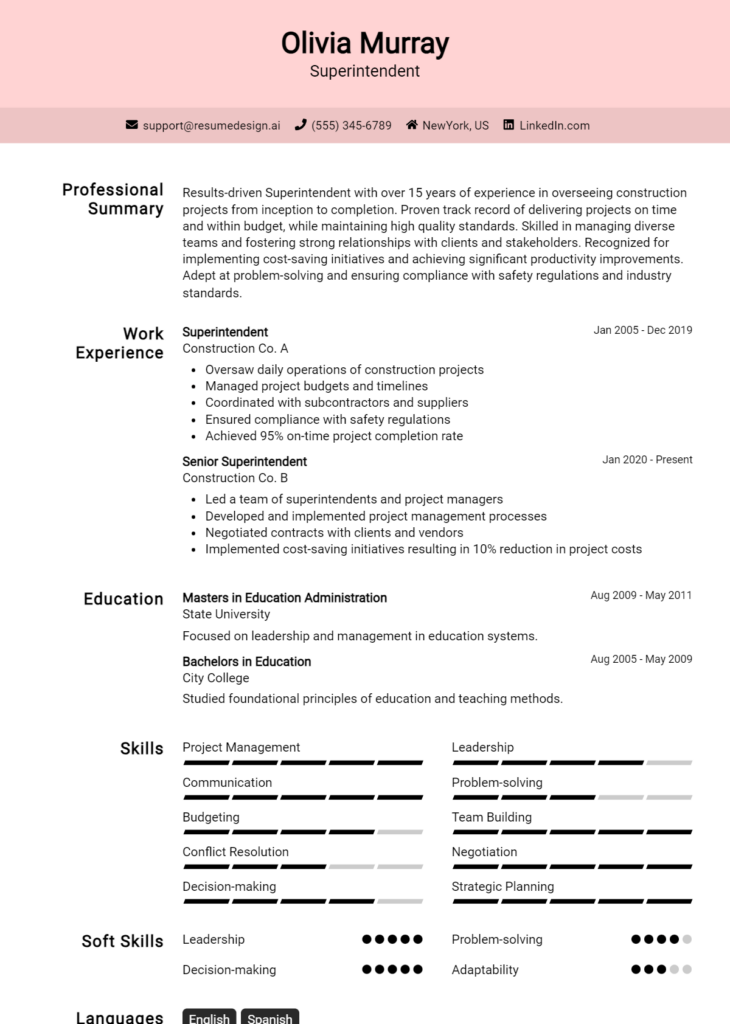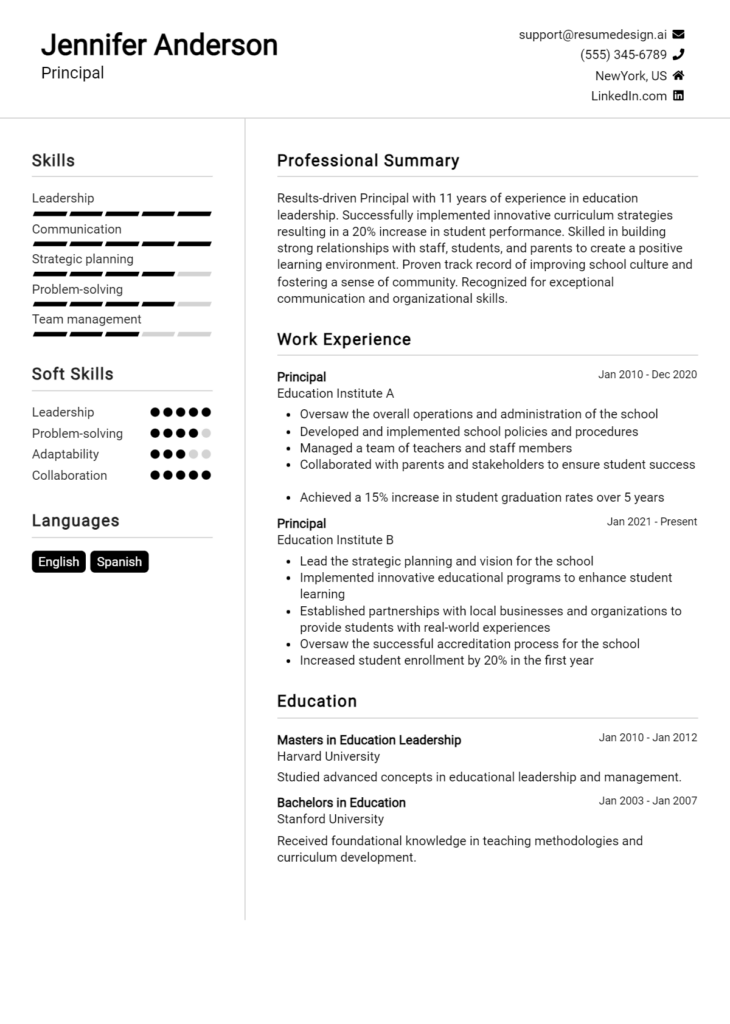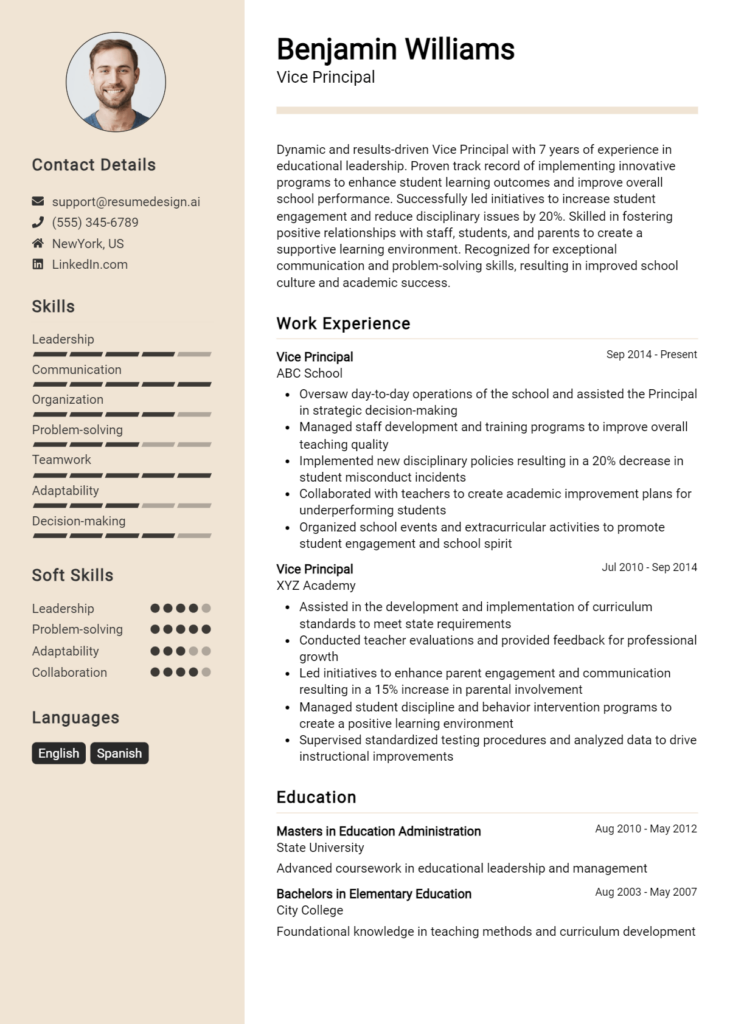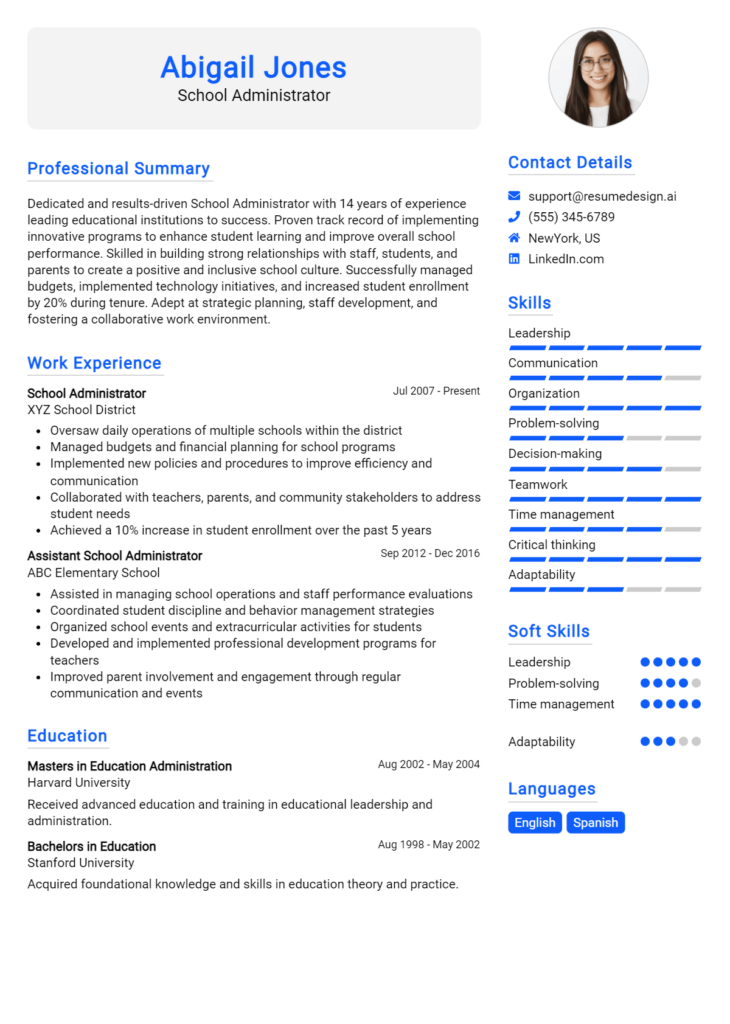Educational Policy Maker Core Responsibilities
Educational Policy Makers play a crucial role in shaping effective educational systems by analyzing data, developing policies, and collaborating across various departments such as finance, curriculum, and administration. They require strong technical skills to interpret educational research, operational skills for implementing strategies, and problem-solving abilities to address challenges within the educational landscape. These skills are vital for achieving organizational objectives, and a well-structured resume can effectively highlight these qualifications, showcasing the candidate’s ability to drive meaningful change.
Common Responsibilities Listed on Educational Policy Maker Resume
- Conducting research and analysis to inform educational policies.
- Collaborating with stakeholders to develop and implement educational initiatives.
- Evaluating the effectiveness of existing policies and programs.
- Preparing reports and presentations for decision-makers.
- Engaging with community organizations to promote educational equity.
- Monitoring legislative changes and their impact on education.
- Facilitating training sessions for educators and administrators.
- Managing budgets and resources for educational projects.
- Developing strategic plans to enhance educational outcomes.
- Advocating for policy changes at local, state, or national levels.
- Building partnerships with educational institutions and agencies.
- Utilizing data analytics to drive policy decisions.
High-Level Resume Tips for Educational Policy Maker Professionals
In the competitive arena of educational policy making, a well-crafted resume is not just a formality; it is a vital tool that can significantly influence your career trajectory. As the first impression you make on potential employers, your resume needs to effectively encapsulate your skills, achievements, and passion for education reform. It serves as the gateway to interviews and, ultimately, your dream job. This guide will provide practical and actionable resume tips specifically tailored for Educational Policy Maker professionals to help you stand out in a crowded job market.
Top Resume Tips for Educational Policy Maker Professionals
- Tailor your resume for each job application by aligning your skills and experiences with the specific requirements of the job description.
- Highlight relevant experience in educational policy, including roles in government agencies, non-profits, or educational institutions.
- Quantify your achievements with concrete data, such as the percentage of policies improved or the number of stakeholders engaged.
- Showcase your understanding of current educational trends and legislative changes that impact policy development.
- Include industry-specific skills such as data analysis, stakeholder engagement, and strategic planning.
- Utilize action verbs to convey your contributions effectively, such as "developed," "implemented," or "advocated."
- Highlight any relevant certifications or continuing education that demonstrates your commitment to professional development.
- Incorporate keywords from the job posting to enhance your resume's visibility in applicant tracking systems.
- Consider adding a summary statement at the top of your resume that encapsulates your core competencies and career goals.
- Keep the format clean and professional, ensuring that your resume is easy to read and visually appealing.
By implementing these tips, you can significantly increase your chances of landing a job in the Educational Policy Maker field. A polished and targeted resume not only showcases your qualifications but also demonstrates your dedication to making a meaningful impact in education policy. With the right approach, you can position yourself as a strong candidate ready to drive change and foster educational improvement.
Why Resume Headlines & Titles are Important for Educational Policy Maker
In the competitive field of educational policy making, a well-crafted resume headline or title serves as a crucial first impression that can set a candidate apart from the rest. A strong headline not only captures the essence of a candidate's qualifications but also immediately grabs the attention of hiring managers who often sift through numerous applications. By summarizing key skills and experiences in a concise and relevant manner, a powerful headline can effectively convey the applicant's suitability for the role and pique the interest of decision-makers. Therefore, crafting a headline that is both impactful and directly related to the position being applied for is essential in showcasing a candidate's potential value to an organization.
Best Practices for Crafting Resume Headlines for Educational Policy Maker
- Keep it concise: Aim for a headline that is no longer than one or two lines.
- Be role-specific: Use terminology and keywords that are relevant to the educational policy sector.
- Highlight key qualifications: Focus on your main strengths, such as years of experience or specialized skills.
- Use action-oriented language: Convey a sense of proactivity and leadership.
- Customize for each application: Tailor your headline to align with the specific job description.
- Avoid jargon: Use clear and straightforward language that is easily understood.
- Emphasize results: If applicable, reference measurable outcomes or achievements.
- Make it compelling: Use persuasive language that draws the reader in.
Example Resume Headlines for Educational Policy Maker
Strong Resume Headlines
"Strategic Educational Policy Maker with 10+ Years of Experience in Curriculum Development"
"Results-Driven Advocate for Educational Reform with Proven Track Record in Policy Implementation"
“Experienced Educational Leader Specializing in Data-Driven Policy Analysis and Advocacy”
“Innovative Policy Developer Committed to Enhancing Educational Access and Equity”
Weak Resume Headlines
“Education Professional”
“Seeking Opportunities in Education”
Strong resume headlines are effective because they are specific, action-oriented, and directly relevant to the role of an educational policy maker. They highlight the candidate's unique qualifications and experiences, making it easy for hiring managers to see their potential contributions at a glance. In contrast, weak headlines tend to be vague and generic, failing to convey any particular strengths or insights into the candidate’s capabilities. This lack of specificity may lead hiring managers to overlook these candidates in favor of those who present a clearer and more compelling narrative of their qualifications.
Writing an Exceptional Educational Policy Maker Resume Summary
A resume summary is a crucial element for an Educational Policy Maker as it serves as the first impression a hiring manager will have of a candidate. A well-crafted summary succinctly highlights essential skills, relevant experience, and notable accomplishments, allowing the candidate to stand out in a competitive job market. It should be concise and impactful, tailored specifically to the job being applied for, effectively conveying how the candidate can contribute to the organization’s educational goals and initiatives.
Best Practices for Writing a Educational Policy Maker Resume Summary
- Quantify Achievements: Use numbers and statistics to demonstrate the impact of your work.
- Focus on Relevant Skills: Highlight skills that directly align with the job description.
- Tailor the Summary: Customize your summary for each application to address the specific needs of the employer.
- Be Concise: Keep it brief, ideally between 2-4 sentences, to maintain the reader's attention.
- Use Action Words: Start sentences with powerful verbs to convey a sense of proactivity and leadership.
- Showcase Leadership Experience: Emphasize any roles that demonstrate your ability to lead and influence educational policies.
- Include Professional Development: Mention relevant certifications or training that enhance your qualifications.
- Articulate Vision: Clearly express your commitment to improving educational outcomes through policy development.
Example Educational Policy Maker Resume Summaries
Strong Resume Summaries
Dynamic Educational Policy Maker with over 10 years of experience in developing and implementing policies that improved student performance by 30% in underperforming schools. Proven track record in collaborating with stakeholders to advocate for equitable funding and educational resources.
Results-driven policy analyst with a Master’s degree in Education Policy, skilled in data analysis and strategic planning. Successfully led initiatives that secured $2 million in funding for innovative educational programs, enhancing access for over 5,000 students.
Dedicated professional with extensive experience in legislative advocacy and policy reform. Instrumental in drafting and passing three significant education bills that increased teacher funding by 25% and expanded access to advanced placement courses in low-income districts.
Weak Resume Summaries
Experienced in education and policy work. I have worked with various organizations and have some knowledge of educational systems.
Policy Maker with a focus on improving education and helping students. I aim to make a difference in the education sector.
The strong resume summaries are effective because they are specific, demonstrate quantifiable results, and directly relate to the responsibilities of an Educational Policy Maker. They highlight relevant skills and experiences that convey the candidate's potential impact on the organization. In contrast, the weak summaries lack specificity, fail to present measurable achievements, and come across as generic, making it difficult for hiring managers to gauge the candidate's qualifications and fit for the role.
Work Experience Section for Educational Policy Maker Resume
The work experience section of an Educational Policy Maker's resume is essential as it effectively showcases the candidate's relevant technical skills, leadership capabilities, and ability to deliver high-quality outcomes in the education sector. This section serves as a platform to demonstrate how the candidate has successfully managed teams, implemented effective educational policies, and contributed to the enhancement of educational frameworks. Quantifying achievements and aligning past experiences with industry standards is crucial, as it provides tangible evidence of the candidate’s impact and effectiveness in the field.
Best Practices for Educational Policy Maker Work Experience
- Utilize action verbs to clearly articulate your role and contributions.
- Quantify achievements with specific metrics, such as percentages, dollar amounts, or number of people impacted.
- Highlight technical expertise relevant to educational policy, such as data analysis or policy drafting.
- Showcase examples of collaboration with stakeholders, including educators, government officials, and community organizations.
- Focus on results-oriented statements that reflect your contributions to successful policy implementation.
- Tailor your experience to align with the specific requirements of the position you are applying for.
- Include professional development activities that enhance your skills in educational policy making.
- Use concise and clear language to maintain readability and engagement.
Example Work Experiences for Educational Policy Maker
Strong Experiences
- Led a cross-functional team to implement a new curriculum framework across 50 schools, resulting in a 20% increase in student performance metrics within one academic year.
- Developed and executed a state-wide educational policy initiative that secured $2 million in funding, benefiting over 10,000 students in underserved communities.
- Collaborated with local education authorities to create a data-driven assessment strategy that improved teacher evaluations by 30%, enhancing instructional quality.
- Facilitated stakeholder workshops that brought together educators, parents, and community leaders, resulting in the successful launch of three innovative educational programs.
Weak Experiences
- Worked on various educational projects that were not clearly defined or impactful.
- Assisted in team meetings without specifying contributions or outcomes.
- Participated in policy discussions with little emphasis on individual achievements or results.
- Helped implement changes in education systems without quantifying the effects or detailing specific roles.
The examples categorized as strong experiences demonstrate clear, quantifiable outcomes and showcase the candidate's technical leadership and collaborative efforts. They provide specific metrics that highlight the candidate's effectiveness in improving educational policies and outcomes. Conversely, the weak experiences lack specificity and do not convey meaningful contributions or measurable impacts, making them less compelling to potential employers.
Education and Certifications Section for Educational Policy Maker Resume
The education and certifications section of an Educational Policy Maker resume is crucial as it showcases the candidate's academic foundation, relevant industry certifications, and commitment to continuous professional development. This section not only provides insight into the educational qualifications that equip the candidate with the necessary skills for policy development and analysis but also emphasizes their dedication to staying current in the field. By detailing relevant coursework, certifications, and specialized training, candidates can significantly enhance their credibility, demonstrating their alignment with the job role and their preparedness to tackle the challenges of educational policy-making.
Best Practices for Educational Policy Maker Education and Certifications
- Include only relevant degrees and certifications that pertain to educational policy and administration.
- Provide details about specific coursework that relates to policy analysis, educational leadership, or statistics.
- Highlight advanced or industry-recognized credentials, such as a PhD in Education Policy or certifications from reputable organizations.
- Consider including ongoing education initiatives, such as workshops or seminars, to showcase commitment to lifelong learning.
- List educational institutions in reverse chronological order, starting with the most recent.
- Use specific names of certifications and courses to enhance the credibility of the qualifications listed.
- Keep the section concise and focused, avoiding excessive detail about unrelated coursework or credentials.
- Tailor the education and certifications section to match the job description and requirements of the position being applied for.
Example Education and Certifications for Educational Policy Maker
Strong Examples
- PhD in Education Policy, University of California, Berkeley, 2020
- Certified Educational Planner (CEP), National Association of School Psychologists, 2021
- Master's in Public Policy with a focus on Education Reform, Harvard University, 2018
- Graduate Certificate in Data-Driven Decision Making, Stanford University, 2019
Weak Examples
- Bachelor's in History, State University, 2005
- Certification in Microsoft Office Suite, 2010
- Diploma in Early Childhood Education, Community College, 2000
- Online course in Basic Teaching Techniques, 2022
The examples listed above are considered strong because they reflect advanced degrees and certifications directly relevant to the field of educational policy, demonstrating a high level of expertise and commitment to the profession. In contrast, the weak examples are less effective as they include outdated or irrelevant qualifications that do not align with the expectations for an Educational Policy Maker, such as basic certifications or degrees unrelated to policy-making.
Top Skills & Keywords for Educational Policy Maker Resume
As an Educational Policy Maker, possessing the right skills is crucial for crafting effective policies that can significantly impact the educational landscape. A well-structured resume showcasing both hard and soft skills not only highlights your professional capabilities but also demonstrates your ability to navigate complex educational systems. Employers look for candidates who can blend analytical thinking with interpersonal skills, ensuring that policies are not only data-driven but also considerate of the diverse needs of students, educators, and communities. By emphasizing the right skills, you can set yourself apart in a competitive job market and show potential employers your value in shaping the future of education.
Top Hard & Soft Skills for Educational Policy Maker
Soft Skills
- Communication
- Critical Thinking
- Collaboration
- Empathy
- Problem-Solving
- Negotiation
- Leadership
- Adaptability
- Conflict Resolution
- Cultural Competence
- Public Speaking
- Time Management
- Relationship Building
- Teamwork
- Creativity
Hard Skills
- Data Analysis
- Policy Development
- Research Methodology
- Regulatory Knowledge
- Budget Management
- Statistical Software Proficiency
- Educational Assessment
- Program Evaluation
- Grant Writing
- Knowledge of Educational Laws
- Strategic Planning
- Project Management
- Curriculum Development
- Stakeholder Engagement
- Technology Integration
To further enhance your resume, consider incorporating relevant skills and showcasing your work experience in the educational sector, as these elements play a vital role in demonstrating your qualifications for an Educational Policy Maker position.
Stand Out with a Winning Educational Policy Maker Cover Letter
I am writing to express my enthusiasm for the Educational Policy Maker position at [Organization Name]. With a robust background in education policy development and implementation, coupled with my passion for fostering equitable educational opportunities, I am confident in my ability to contribute effectively to your team. My experience working with various stakeholders, including educators, administrators, and community organizations, has equipped me with the skills necessary to advocate for policies that promote student success and systemic improvement.
In my previous role at [Previous Organization Name], I successfully led initiatives that addressed critical issues such as access to quality education and curriculum alignment. By conducting comprehensive research and engaging with diverse communities, I was able to develop strategic policy recommendations that were not only data-driven but also responsive to the needs of those affected. My collaboration with local government and educational institutions resulted in the implementation of several programs that increased student engagement and improved academic outcomes. I am particularly proud of a project that introduced innovative teaching methodologies in under-resourced schools, which received positive feedback from both educators and students alike.
I am particularly drawn to [Organization Name] because of your commitment to advancing educational equity and reform. I admire your initiatives aimed at bridging the achievement gap and believe that my strategic vision aligns with your goals. My ability to analyze complex educational systems and identify key areas for policy intervention would allow me to contribute meaningfully to your ongoing projects. Furthermore, my strong communication skills enable me to effectively articulate policy objectives to diverse audiences and foster collaborative relationships that drive change.
I am excited about the opportunity to bring my expertise to [Organization Name] and work alongside a team dedicated to improving educational outcomes for all students. Thank you for considering my application. I look forward to the possibility of discussing how my background, skills, and passion for education policy can benefit your organization.
Common Mistakes to Avoid in a Educational Policy Maker Resume
Creating a resume as an Educational Policy Maker requires careful attention to detail and a clear demonstration of relevant skills and experiences. However, many candidates make common mistakes that can undermine their chances of landing an interview. Understanding these pitfalls can help you craft a more effective resume that effectively showcases your qualifications. Here are some of the most frequent mistakes to avoid:
Generic Objective Statement: Using a vague objective statement that doesn’t specifically relate to the role can make your resume blend in. Tailor your objective to reflect your passion for educational policy and the specific position you’re applying for.
Neglecting Quantifiable Achievements: Failing to include metrics or quantifiable results in your experience can weaken your impact. Highlight specific accomplishments, such as policy changes implemented or improvements in educational outcomes, to demonstrate your effectiveness.
Overloading with Jargon: While it’s important to demonstrate knowledge of the field, using excessive jargon can alienate readers. Aim for clarity and ensure that your resume is accessible to a broader audience, including those in HR.
Ignoring Relevant Skills: Not emphasizing key skills such as data analysis, stakeholder engagement, or strategic planning can result in your resume being overlooked. Align your skills with the job description to ensure they stand out.
Lack of Tailored Content: Submitting the same resume for multiple positions can be detrimental. Customize your content to reflect the specific requirements and goals of each role to show genuine interest and alignment.
Poor Formatting: A cluttered or unprofessional format can make it difficult for hiring managers to read your resume. Use clear headings, bullet points, and a clean design to enhance readability and presentation.
Omitting Professional Development: Failing to include relevant certifications, workshops, or ongoing education can leave a gap in your qualifications. Showcase your commitment to continuous learning in the field of educational policy.
Neglecting Soft Skills: Underestimating the importance of soft skills, such as communication, collaboration, and problem-solving, can be a mistake. Highlight these attributes as they are crucial for effective policy-making and stakeholder interaction.
Conclusion
As an Educational Policy Maker, your role is pivotal in shaping the future of education through effective policy development and implementation. This article has explored the critical competencies required for success in this field, including analytical skills, an understanding of educational systems, and the ability to collaborate with diverse stakeholders. We also highlighted the importance of staying informed about current educational trends and legislative changes, as well as the need for strong communication skills to advocate for policy initiatives.
In conclusion, it is crucial to ensure that your resume reflects your qualifications and experiences effectively. Take a moment to review your Educational Policy Maker Resume and make any necessary updates to showcase your skills and accomplishments. Utilize the various resources available to you, such as resume templates, a resume builder, resume examples, and cover letter templates. These tools can help you create a polished and professional resume that stands out in the competitive job market. Don't miss the opportunity to present yourself as a strong candidate—start enhancing your resume today!

